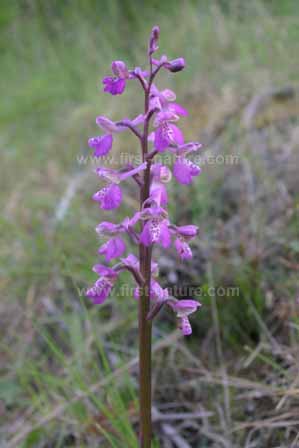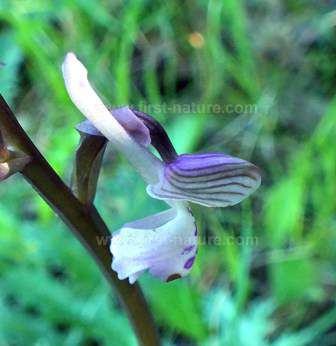Anacamptis longicornu - Long-spurred Orchid
Phylum: Magnoliophyta - Class: Liliopsida - Order: Orchidales - Family: Orchidaceae

This orchid is a member of the Anacamptis morio (Green-winged Orchid) group and is rather similar to Anacamptis champagneuxii(Champagne Orchid) with which it occurs in the western Mediterranean region. It is, however, a much bigger plant and carries more individual flowers on each spike. Also, unlike the Champagne Orchid, the lip has obvious markings almost in the form of two vertical lines of spots. Anacamptis longicornu also has an exceptionally long spur, up to 17 mm, which is sometimes slightly curved but more often straight.
Anacamptis morio is in sharp decline in the UK and other parts of Europe due to the farming industry's excessive use of herbicides, but it is still possible to find it, as well as its close relatives the Champagne Orchid and the Long-spurred Orchid, in large numbers in the Mediterranean countries where traditional farming methods are still the order of the day.

The long spur that gives Anacamptis longicornu its name
Apart from the Iberian Peninsula, where it is well-known, Anacamptis Longicornu occurs also in Corsica, Calabria and other Mediterranean countries.
This specimen was photographed in the Algarve in Portugal during April.
Etymology
The genus name Anacamptis comes from the Greek anakampto, meaning 'bent back'; it refers to the shape of the flower spur. The specific epithet morio is Latin and means 'clown'. The striped and spotted flowers of the Early Purple-orchid are said to resemble the appearance generally associated with clowns., while the subspecies name longicornu refers to the unusually long spur (horn) of the flower of this orchid.
Reference sources
The Plant List
Sue Parker (2023) Wild Orchids of the Algarve - where, when and how to find them; First Nature e-book (Amazon Kindle format)
Chris Thorogood and Simon Hiscock (2014) Field Guide to the Wildflowers of the Algarve; Kew Publishing
Pierre Delforge (2005) Orchids of Europe, North Africa and the Middle East; A&C Black
Please Help Us: If you have found this information interesting and useful, please consider helping to keep First Nature online by making a small donation towards the web hosting and internet costs.
Any donations over and above the essential running costs will help support the conservation work of Plantlife, the Rivers Trust and charitable botanic gardens - as do author royalties and publisher proceeds from books by Pat and Sue.


